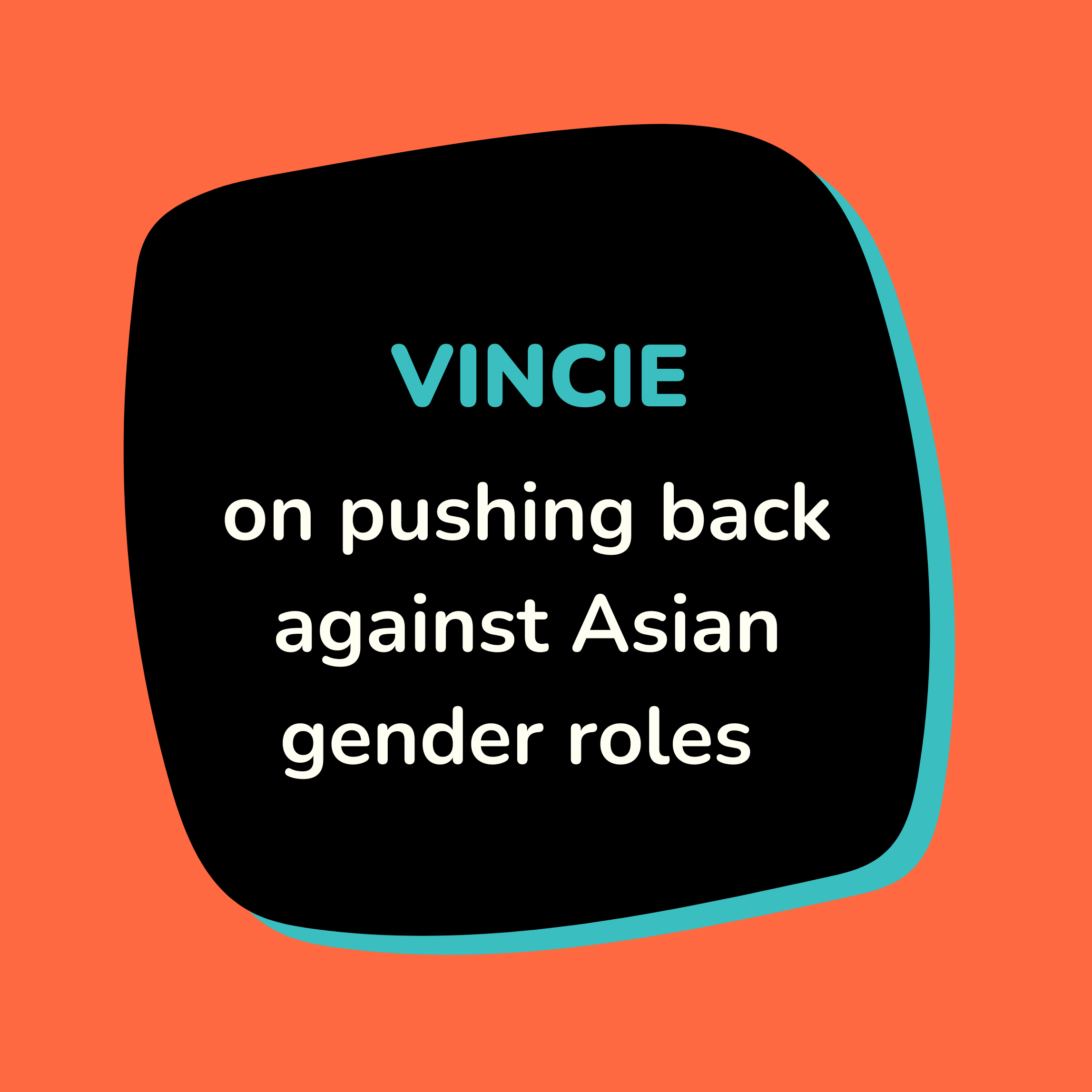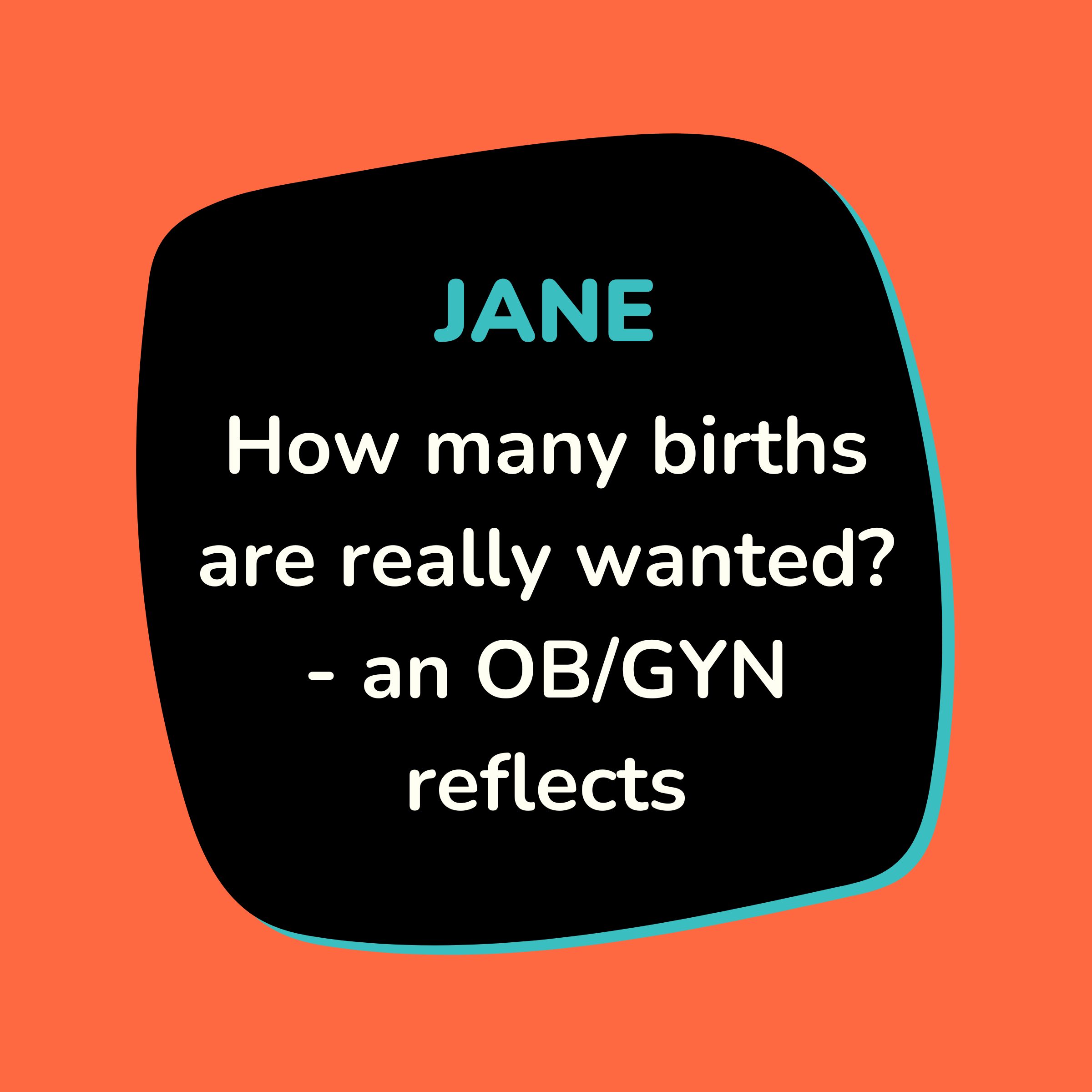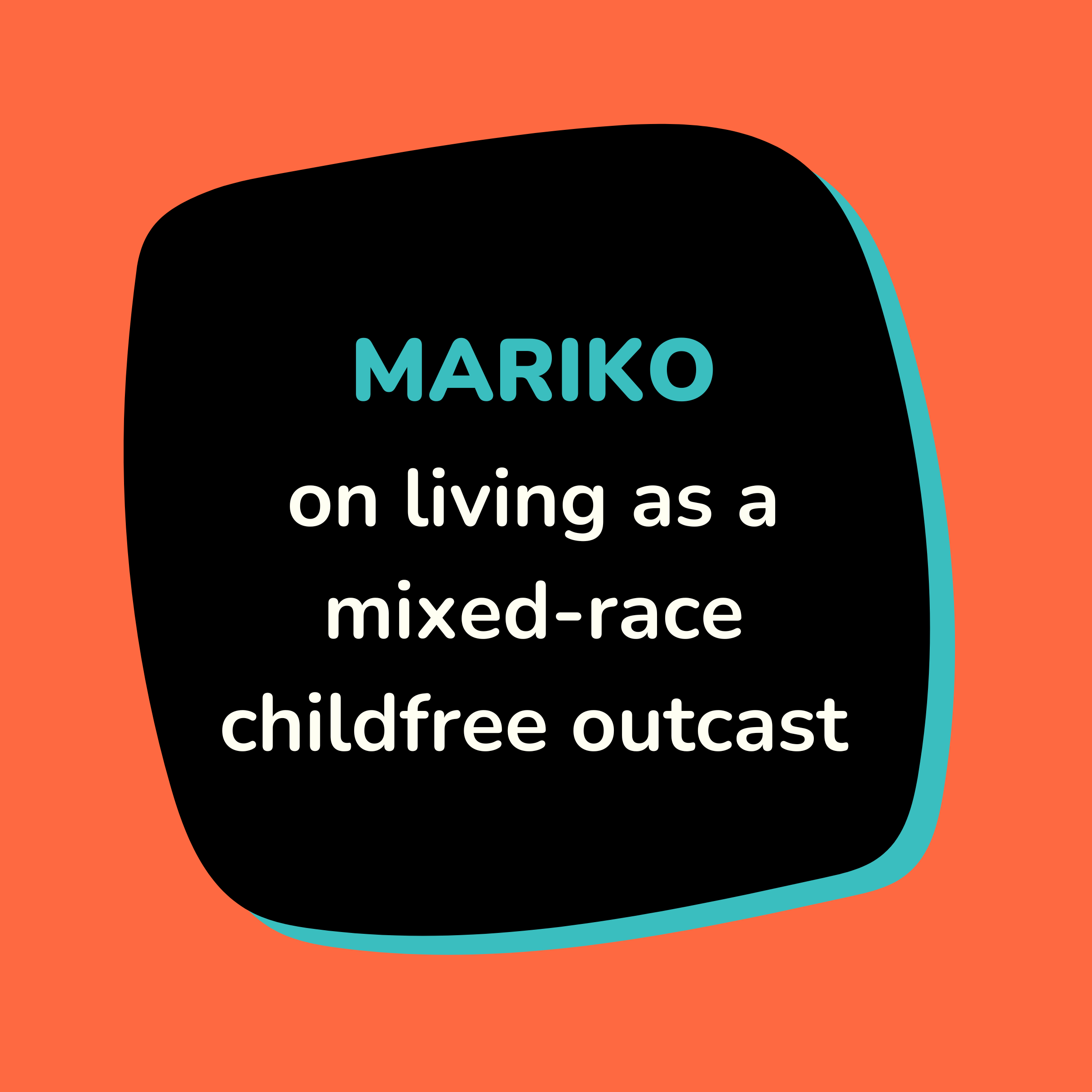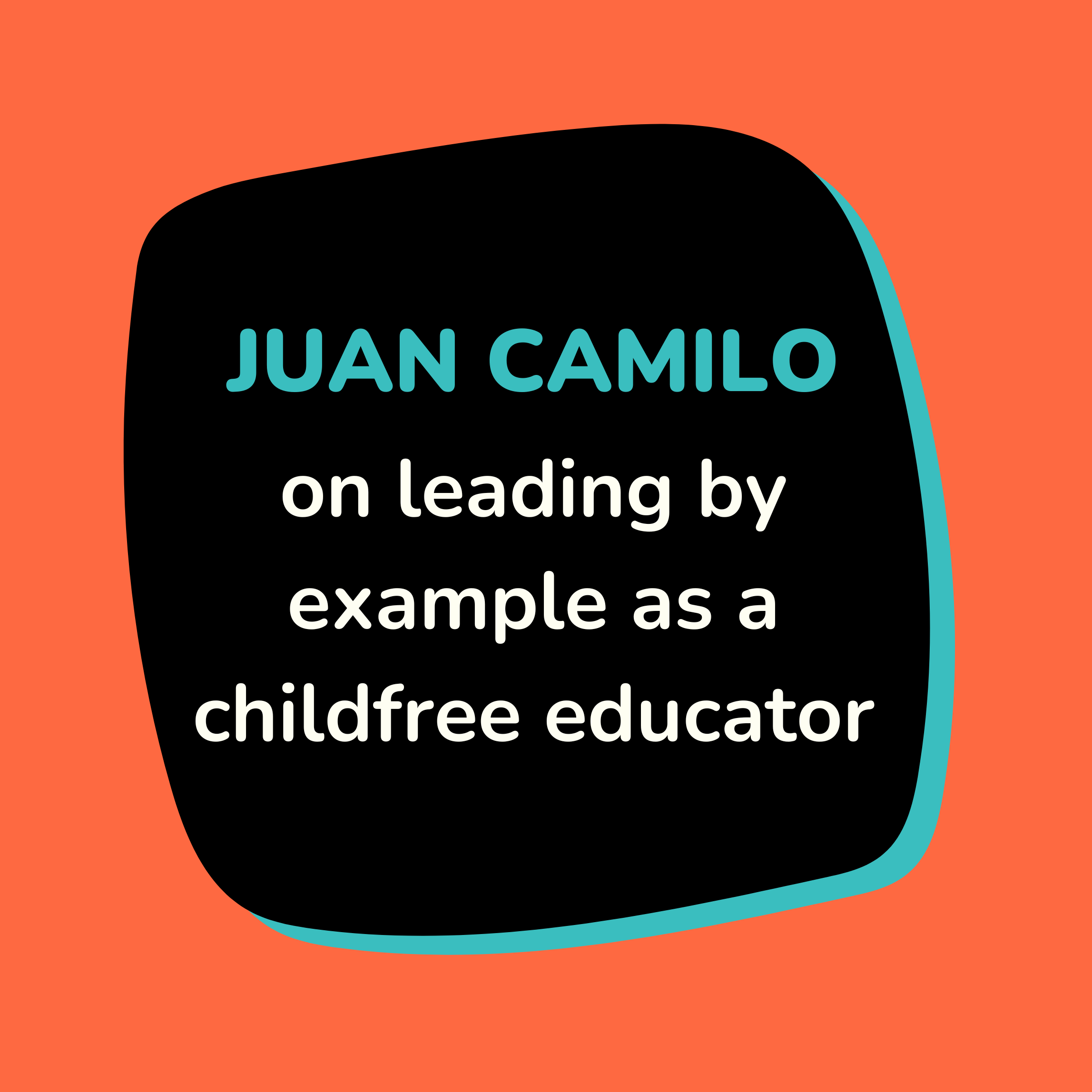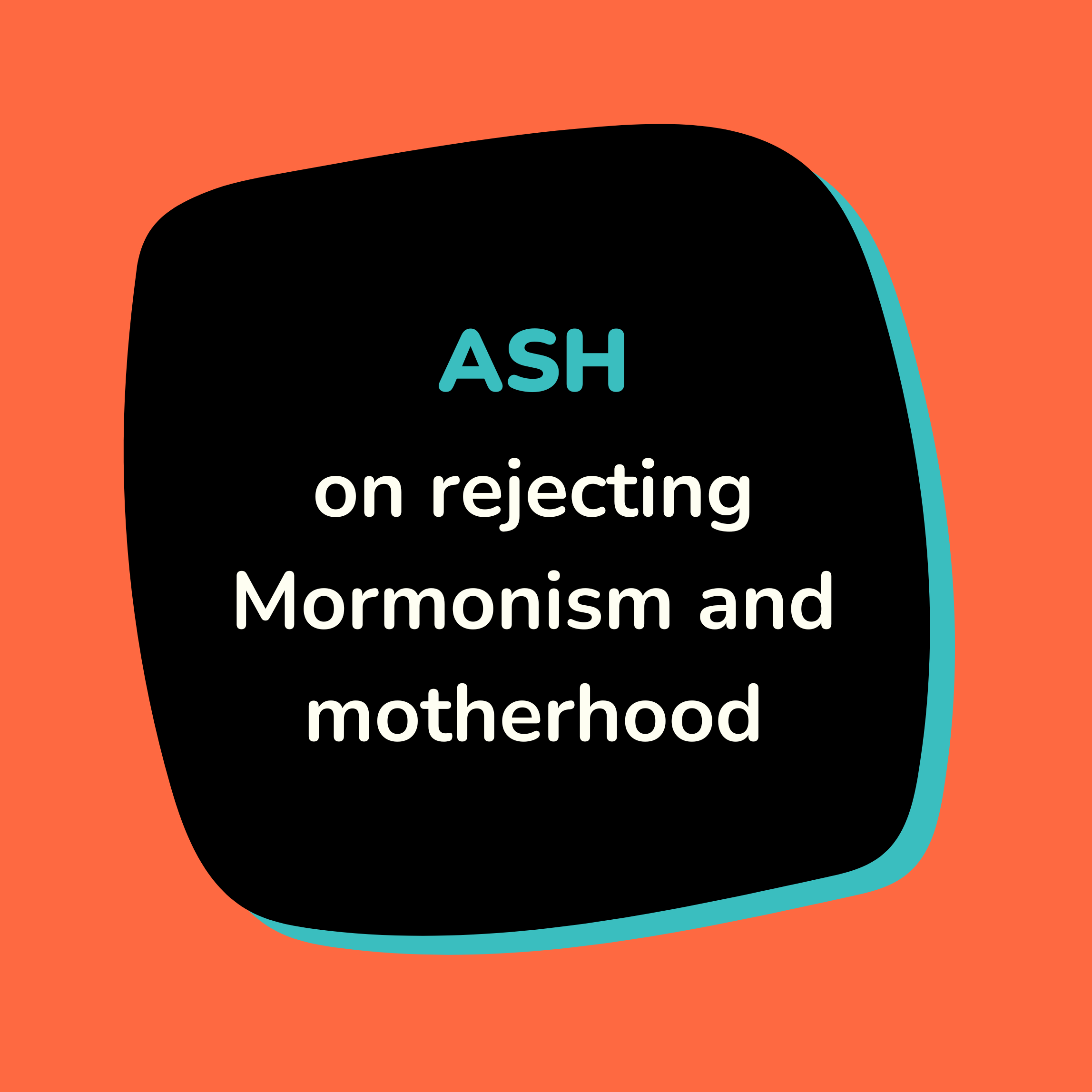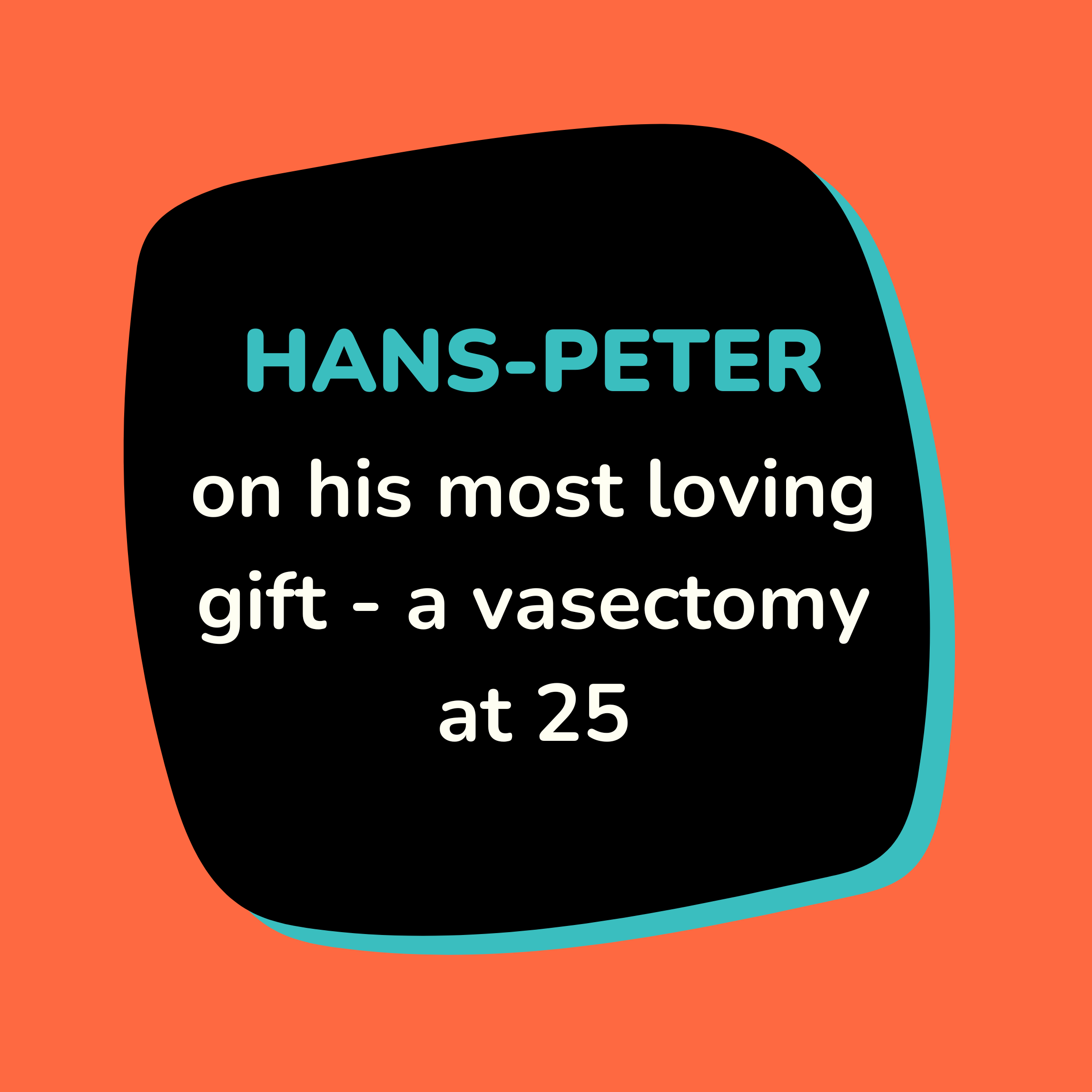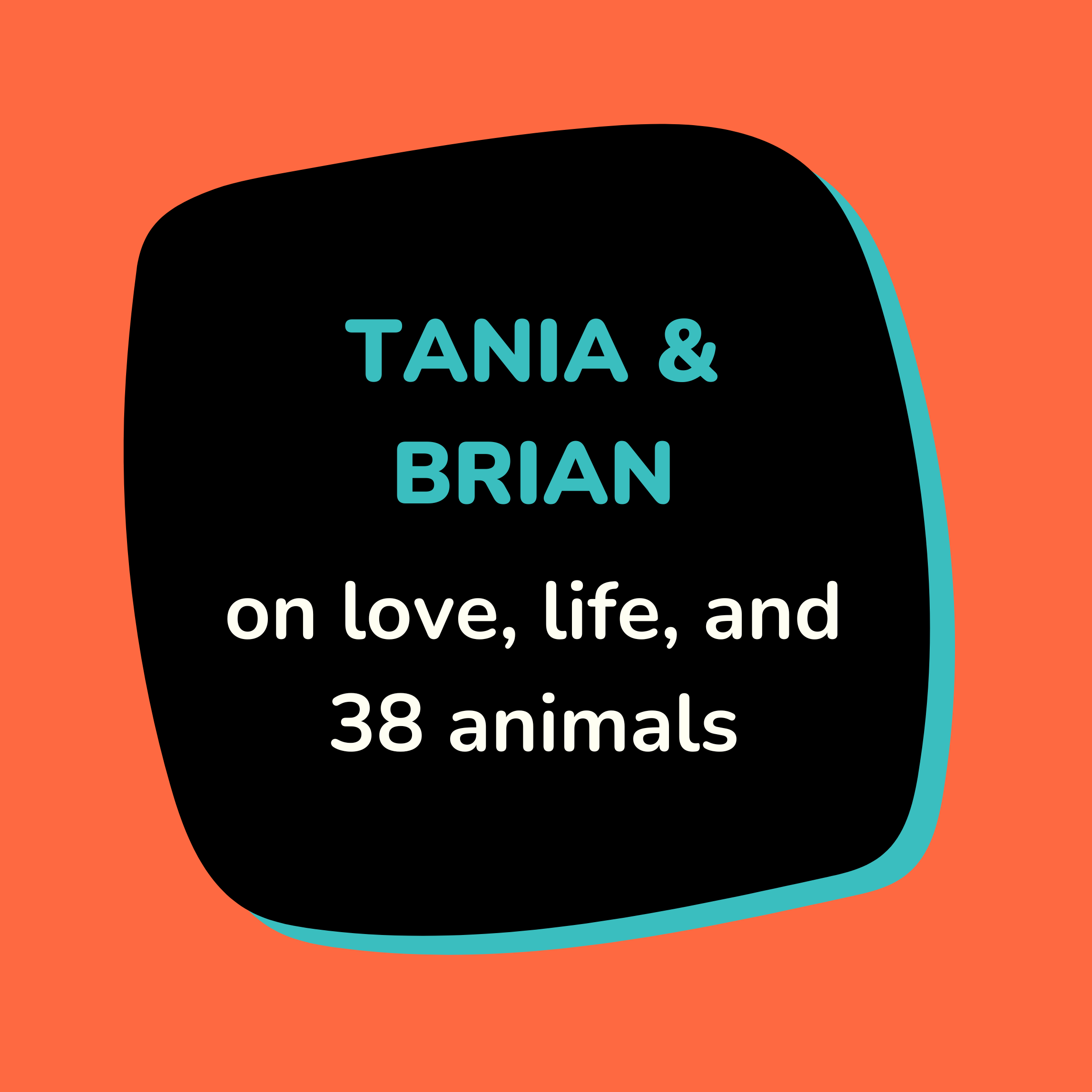Vincie - on pushing back against Asian gender roles
Born and raised in densely-populated Hong Kong and having lived in different parts of the world, Vincie was always deeply concerned about the poor plight of children. She talks about wrestling with traditional family norms and gender roles within Asian culture and arriving at a more liberated decision to not have biological children. Today, Vincie has a deeply fulfilling career and many chosen families, which include her husband, step children, dogs, and close friends around the world.
-
Vincie 0:00
In Chinese culture, the definition of happiness is pretty much dictated by whether you're married and whether you have kids. And I remember having conversations with my mom after I got married in my early 30s. My mom asked whether I wanted to have kids. And I said, No. I remember her saying that without a kid, your family wouldn't be complete, and your life as a woman wouldn't be complete.
Nandita Bajaj 0:38
That was today's guest, Vincie. Hello everyone, and thank you for joining me on this journey. My name is Nandita Bajaj, and I'm the host of Beyond Pronatalism: Finding Fulfillment, With or Without Kids, an interview series in which, through intimate conversations with women and men from diverse backgrounds, I explore how they are courageously and creatively navigating pronatalism - the often unspoken pressures to have children, whether from family, friends, or the culture at large. In each episode, I dive into personal stories with people who are forging unconventional pathways to fulfillment, including redefining what family means to them - whether that means being childfree or childless, having biological kids, adopting or fostering children or animals, or creating close-knit communities of friends and loved ones. Hi Vincie.
Vincie 1:34
Hi Nandita.
Nandita Bajaj 1:35
It's so nice to have you on the show. Thank you very much for joining us.
Vincie 1:40
Thank you so much for having me.
Nandita Bajaj 1:42
This is going to be a brilliant conversation, because I know a little bit about your story. And so why don't we begin with a little introduction about yourself, where you grew up, what you do, anything that you think is relevant.
Vincie 1:57
Sure, absolutely. My name is Vincie. I am currently based in New Jersey, the United States, but I was born and raised in Hong Kong. And so I left Hong Kong at the age of 20 to study in Europe, namely in the UK and France. And then I went back to Hong Kong to start my career as a teacher. I worked there for over 10 years, before I decided to quit my job and go see the world. And so I got the chance to do an internship in Senegal in Africa, working with refugees and asylum seekers. And then I moved here to the United States in 2013-2014, so it's been about 10 years that I'm here where I am.
Nandita Bajaj 2:48
Amazing. And it would just be great to hear what the cultural experience of pronatalism was like in Hong Kong, the pressure to have children, or the idea around family.
Vincie 3:02
Right. So Hong Kong has the image of being a cosmopolitan city, but in terms of demographic, I think over 90% of its population is ethnically Chinese. So growing up in a Chinese society, obviously we do have a little bit of pressure of having kids. But then Hong Kong is kind of also a very contemporary, like modern city as well, and it's overpopulated. So my parents' generation, they started to not have too many kids, I would say. And also I still remember in the 70s and 80s, the government was trying to educate families not to have too many kids, because back in the 70s the population in Hong Kong was rising rapidly due to an influx of immigrants from China. I still remember this campaign called Two is Enough, and I still remember the song. And so fast forward to 2023 the Hong Kong government now is reacting to the record low birth rate in the city, you know, possibly because of the brain drain and the mass migration caused by the geopolitics happening over there in the region. And so they have been offering a one-off 20,000 Hong Kong dollars bonus to parents to incentivize them to have children. And that amount is equivalent to 2,560 US dollars per kid. So the measure will be in place for at least three years until it gets reviewed. In addition to this cash handout, legislators are now proposing or advocating for other social welfare benefits for families with children. So for example, subsidies for homeownership, priority to access public housing, tax breaks for new parents, you know, more subsidized daycares, and subsidies for IVF and egg freezing, and yeah, an increase in working family allowance for low income families who have children. So yeah, like on the surface, the government seems to be doing a lot to support families with kids, but essentially, what they're trying to do is to encourage people to have kids because they're worrying about the GDP, probably with all the people who have left and are planning to leave. And then, on the other hand, many young couples are not convinced. They're worried or have concerns about raising children in the current political climate, and also due to the lack of trust and the changing education system as well. So a lot of my friends have left Hong Kong. I would say 80% of my friends in my own social network have left Hong Kong, and many of them are now in the UK. And back to your question, as I was growing up, I would say that definitely it was a Chinese culture that I was growing up, and the definition of happiness is pretty much dictated by whether you're married and whether you have kids. And I remember having conversations with my parents, with my mom specifically, after I got married for the first time. This is my second marriage that I'm in right now. But when I was married for the first time in my early 30s, my mom asked whether I wanted to have kids, and I said no. And I'm gonna explain why in a bit, you know about my choice. But I remember her saying that, without a kid, your family wouldn't be complete, and your life as a woman wouldn't be complete. And you know, having kids, it's what women should do. And also, when you get old, if you decide not to have kids now, when you get old, who's going to take care of you? And I said to mom, I think that's a little selfish, because I want someone to take care of me that, I don't know, that I make a baby now? So that didn't really make sense to me. And so my decision of not having kids very, very early on in my 20s, because I was convinced that there were enough children on the planet who don't have access to basic human rights, because I got really interested in world politics, in the state of affairs where the world was in back then, and I started to educate myself about what's going on in different parts of the world. And then I just realized that, wow, like there are a lot of kids out there, and why do we continue to have more. And so why can't we just support them? And if you genuinely love children, why do we, I mean I understand now that, like some people do want to have children of their own, but to me back then, I was like, why should we care more about human lives that are related to us more than those who are not.
Nandita Bajaj 8:25
Well, thank you for sharing that journey, which is so fascinating, all the things that you've shared. The first one being you know just how with declining birth rates, Hong Kong, like most low fertility countries, is responding: one being suddenly starting to offer really great benefits and childcare and parental care and things that you would think in a good society would just be a given, and that would be available to everyone, regardless of whether they had children or not. And it's just seen as a way of trying to bribe people just to increase numbers, increase reproduction, because those same benefits are not available to people who are single, who don't own homes, who don't have children, who have similar responsibilities, who have similar burdens in life. So I think that's fascinating, that you're noticing that.
Vincie 9:27
Absolutely. Going back to the situation in Hong Kong, so I started talking about how things were in the 70s, but recalling the generation of my grandparents or their parents, like our great-grandparents. Many of them had eight, nine, ten kids, like a lot of kids, and well, Hong Kong is made up of immigrants from China, you know. And back then, China was an agricultural country, and we needed the workforce and so on. And also, because of lack of education and sex education most people had a lot of kids, a lot. My maternal grandma was the seventh in the family, and I couldn't help back then, when I got to know that an uncle was the 25th in his family, while his mother was the third wife, I couldn't help but imagine the lack of life his mother had. Like, his mother had no life. So basically, like, every year, every other year, she would have to, like, pop another child, right? And so her entire life, that was her job. And that also makes me think about all these puppy mills, like, you know, these puppies or these dogs or cats or domestic animals, they got trapped and and their entire life is about reproduction. Like, imagine being trapped for your entire life, and you only have one role, and that is to procreate. I just cannot imagine. And therefore, I'm super grateful for the freedom that my parents have given me to choose the life that I want to live. So going back to sharing a little bit about my parents' view, I really appreciate that they didn't force me into doing anything that I didn't want. However, I do feel that there's a sense of lack or sadness even, that they actually communicated with me and my brother. I have a older brother who's two years older than me, and we both decided to be childfree. And so when my parents got into this life stage where their peers all start to have grandchildren, posting their pictures on Facebook and so on, and they felt that something was missing in their life. And they were sad. And I felt sad to see them sad too. But I had a very candid conversation with my mom. I think it was probably 10 years ago. We were in a coffee shop, and she told me that, you know, some of her best friends, they are having grandchildren, and they're always talking about their grandchildren, and she kind of felt left out, and not being on the same page like made her feel sad. And I acknowledged how she felt, and I was saying to her, I'm sorry you're feeling this way. And you know, however, I can't just decide to have a kid to make your life feel complete, because that's not what I want in my life. And of course she understood, but it was something that that she felt was missing in her life. Another time that was just really broke my heart, when I was back in Hong Kong to visit my family, my parents, and after then some lunch, we there was an Ikea right next to the dim sum lunch place. And we're like, Okay, well, let's go for a walk. And, you know, in Hong Kong, when we say, Let's go for a walk, it's like shopping malls, because we don't really have like a lot of outdoor space in the city center, right? And it's super hot, so, yeah, shopping. And so we went into an Ikea. And I'm not sure if you're familiar with IKEA. They set the store up in a way that you cannot just leave after five minutes, that you are coerced to following the maze, like following the path and going through all the departments, right? And so when we were going through the kids department, like with all the baby cribs and so on, and she picked up a plush toy. And she was like, Isn't this cute? Can I get it for Chili, my dog, well, because I don't have human grandkids anyways. That was very funny looking back, but at the time, I felt her sadness, and she just couldn't help reminding me of that. Of course, I didn't say anything, and I said that, you know, I appreciated it. And now, every time they would buy toys and snacks for my dogs. I have two now, and they've stopped making that additional comment, so I think they've come to terms with the fact that having grandchildren is not going to happen.
Nandita Bajaj 14:34
Yes, that is such a nice development. Isn't it interesting? It's not just our lives that are totally wrapped up around how to live, which includes being with a partner, which includes having children, a house, and everything else that we are told is normal, but then also how there's an extra layer of it. Our parents are totally wrapped up in the same setup. They find meaning in not just being involved in our lives as their children, but then also the next stage of their life is to become grandparents. And I think any epiphanies that we have about choosing a different life path, we're also forcing our parents or our family members that rely on that built-in life path to think differently as well.
Vincie 15:27
Totally agree with you, and which is why I sometimes do have this guilt as well. By choosing the life that I want, I'm depriving them of the life or experience that they wanted to have. Of course, I understand that this is all like social construct and all set up, but that doesn't validate their feelings, right? And filial piety comes into play as well in the Chinese society. So having offsprings is almost like your life obligations, and if you're not fulfilling them, you are not being kind to your parents. So of course, that is like a dated concept nowadays. There are some families that are more tradition than others. I would say that my family is kind of in between. But then, if you are from a very traditional family, then that probably would look very differently.
Nandita Bajaj 16:24
Yeah, you can see from that perspective - if you choose, if I chose not to have children, and we both come from fairly traditional societies, then you can see why it could be perceived as a selfish decision?
Vincie 16:42
Oh yes, absolutely. And the fact that I choose to be more educated, the fact that I choose to do what I'm doing right now, like leading a nonprofit, teaching at the university. These things are very fulfilling to me. However, it may not be perceived as as fulfilling to my parents than me having a kid or me playing the prescribed gender role. And I think it happened the last time when I went back to Hong Kong. I was having lunch with my parents, and my mom suddenly asked me how things were and I said, Well, I'm very busy. And she knew that I was very busy with my multiple professional roles. And so my mom asked, you do know that men don't like women to be more successful than them, and you do know that they, meaning men, don't like women to be smarter than them, but Kelvin loves you so much that he didn't say anything. So me, by engaging in all my professional activities, that automatically means that I'm not paying attention to my home and my family. And so I was like, Mom, first of all, Kevin is as smart and as educated as I am, and there's no comparison there. And secondly, we do share our housework. So we have been working as a team at home, and it's not like the woman is expected to do everything, or that I'm spoiled that my husband has to do everything. It's a pretty equitable relationship that we are having. And also, thirdly, Kelvin has been super supportive of my work, and he's super proud of the baby milestones that we are achieving with the organization. And so I understand that you have been worrying about my physical and mental health because I'm pretty burned out, and that I really appreciate. But that shouldn't be a conversation about my gender role and all the expectations that she had about what a wife should be doing, you should not be an overachiever. Like it would make her happier if I told her that I had nothing to do on a daily basis and I have a lot of time, like making good meals for my husband. And I also told her that I don't really understand the contradiction, right? Like you spent so much money and you had so much hope for my brother and me to become educated people, and so you invested a lot in me becoming educated, and now I am actually putting my education into good use, and why would you want me to just sit at home and not do anything else but like to fulfill my gender role as a housewife? So it's very contradictory, and sometimes I don't know. I have been, for example, sharing like little milestones and little achievements with my parents, and they don't seem to be very excited about what I'm doing. First of all, probably because they don't really understand what I'm doing. But I also think that that's because I'm not doing what they want needed to be doing.
Nandita Bajaj 20:16
Totally. And the second aspect of what I was talking about earlier is the concept of selfishness. So both you and I and a lot of women we know are doing incredible things in the world with their time, many of whom decided not to have children or didn't even get married and are pursuing these paths, which are in large part very selfless paths. We're giving our money, our time, our resources, to causes that are bigger than ourselves, that are bigger than our biological ties, and then we get called selfish. And it's mind-boggling.
Vincie 21:01
I cannot agree more. I remember having the exact same thoughts when I decided not to have children. I was like, if I decided to have a kid, I would give my kid everything, because you want to be able to raise a good person, right? And so I was like, my time could be better used to educate because I'm an educator, right? And so my time would be better used to educate a lot more human beings, rather than just having my attention focused on one individual, one kid. And so I don't understand why that is selfish, but yeah, we know, we understand why, with the pronatalist ideology that everyone around us and our society has embraced, and it's like just so deeply ingrained. Unfortunately, that it is a very radical idea that you are going around and like sharing with people. Yeah, I did not know about pronatalism as an ideology before you introduced that to me. So I'm super grateful.
Nandita Bajaj 22:15
Oh, thank you. The reason your story is so inspiring is because you arrived at that decision so much more independently and sincerely, and you stuck with it. And maybe as a final question, as we wrap the conversation up, where are you at today with your decision? What does family look like for you? How fulfilled is your life?
Vincie 22:39
Thank you for the question. It's a great question. Before I dive into the answers to this, I actually have a little couple stories like very, very quickly to add to what I shared earlier, that is surprisingly throughout my entire life. Again, my, I did have some difficult conversations with my parents, but they were very understanding. It was more about their emotions and not being able to experience having grandchildren that really bothered all of us. But I would have to say that the most outrageous comments I ever had were from people outside of my family questioning me why I didn't want to have kids. And the first one was my gynecologist, and yeah, I was probably like, in my early 30s, and she was like, well, but your biological clock is ticking. And the other person was the wife of my professor, who was also a professor, and we just happened to be at a reunion with other researchers, like research students, and it was very odd that over lunch, like with everybody there, she had the audacity to ask why I didn't want to have a kid, and why an adopted kid is different from a biological kid. And she started to lecture me, and I could not stand that. And I haven't spoken to her since. Just like, Who do you think you are to lecture me about whether I should have a kid or not? Sometimes, like, people give themselves the permission to tell you what you want or what your body wants. It's so ridiculous. Anyways, back to your question about whether I feel fulfilled right now, where I'm at in my life right now. I would say that I had never felt so fulfilled in my life than the present moment with my work for my nonprofit and also the teaching role in a graduate program on human rights. These are the things that I've always wanted to do, and yes, I may have a lot of work right now, but there is not a single moment where I'm not enjoying it. So I'm feeling very fulfilled. I am still playing the role of an educator, hoping to inspire more people to be thinking more deeply and critically about our decisions about how our relationship with the world and our role in it. And so, yeah, in terms of family, I don't really have a definition for what a family should look like is it can be very versatile. It can take any form that anyone wants for themselves. And so for me, currently, I have my partner, and my partner has two kids, two boys, 12 and 15 years old, and they come to visit us every other weekend, and we have been doing this for years. So I do enjoy seeing how great of a father my partner is, and I do love my step kids, and I also do love the possibility of also having our own lives and when children are not involved. And so we do have the luxury or the flexibility or the privilege to kind of have the best of both worlds, I would say. And then I also have many chosen families, my best friends and my adoptive family in France. Well, they were actually my host family. When I first went to study in France, it was them who hosted me for an entire summer, and ever since, the bond was there, and it's probably been over 20 years that we've been nurturing this friendship or relationship. Yeah, my my host mom is now 85 years old, or she was in her 50s when I met her, and now I became really close as well to my host sister. So my host parents have two daughters, and the older one is now retired, and she was also a teacher, and so we bonded really well. And so they've, like, really embraced me into their family with open arms, and now I'm considered as the third daughter of my host parents, so and also another person that I really love and value is the migrant domestic helper who worked for my parents for like, more than seven years. So that was when I was in high school and going to college, and when I graduated, she was still in Hong Kong, like helping my parents with housework, because I was living with my parents back then, and so we grew up together, and she was born in the same year as me, and we were the same age. And back in the days, I always had this question in my head, like, why am I going to the university and while she's ironing my clothes at home. It's all just because of where we were born, like the society that we were born into that kind of determined what life paths that we had access to, and so we are still very close. And I know she wants to start a business, like a small grocery business, so I am supporting her with that. It's really the feeling of having an extended family somewhere in a part of the world that you may have never been but you know that you have a family there.
Nandita Bajaj 28:25
I love that. And of course, you've got your two dogs at home.
Vincie 28:29
And of course they they are the best. They are like the absolute best, Chili and Mango. And I just love them so much. We are very lucky. We're very, very lucky. They are very good girls.
Nandita Bajaj 28:46
Well, Vincie, this seems like such a nice place to wrap up the conversation. Thank you so much for sharing your most inspiring story and for being so candid and personal.
Vincie 28:59
Thank you so much, Nandita, for having me and like creating this platform for more women and allies to share their stories. So I really appreciate it. Thank you.
Nandita Bajaj 29:09
That's all for today's episode. Thank you so much for listening. What did you think of this episode? Do you have your own story you'd like to share? Check out the show notes to see how you can get in touch with me. Whether you'd like to share feedback about the show or a particular episode, or whether you'd like to join me on the show to share your own story, I'd love to hear from you. Thank you so much again for joining me today as we collectively discover and celebrate the many different pathways to fulfillment beyond pronatalism. Beyond Pronatalism is brought to you by Population Balance, the only nonprofit organization advancing ecological and reproductive justice by confronting pronatalism. This podcast is produced and hosted by me, Nandita Bajaj, with the support of my production team: Josh Wild, Elisabeth Strunk, Alan Ware, and Kirsten Stade.
More like this
Share your story!
Would you like to be on the show to share your own story? We’d love to hear from you!
Join our mailing list
Subscribe to our newsletter to be the first to know when a new episode is launched.


